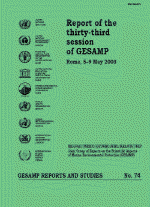
GESAMP Reports and Studies No. 74
Report of the Thirty-third Session of GESAMP, Rome, 5-9 May 2003
IMO/FAO/UNESCO-IOC/WMO/WHO/IAEA/UN/UNEP Joint Group of Experts on the Scientific Aspects of Marine Environment Protection (GESAMP)
 |
GESAMP Reports and Studies No. 74 Report of the Thirty-third Session of GESAMP, Rome, 5-9 May 2003IMO/FAO/UNESCO-IOC/WMO/WHO/IAEA/UN/UNEP Joint Group of Experts on the Scientific Aspects of Marine Environment Protection (GESAMP) |
|
FOOD AND AGRICULTURE ORGANIZATION OF THE UNITED NATIONS Rome, 2003
|
| The designations employed and the presentation of material in this publication do not imply the expression of any opinion whatsoever on the part of the Food and Agriculture Organization of the United Nations concerning the legal status of any country, territory, city or area or of its authorities, or concerning the delimitation of its frontiers or boundaries. |
ISBN 92-5-105026-0
ISSN 1020-4873
For bibliographic purposes this document should be cited as:
GESAMP (IMO/FAO/UNESCO-IOC/WMO/WHO/IAEA/UN/UNEP Joint Group of Experts on the Scientific Aspects of Marine Environmental Protection). 2003. Report of the thirty-third session, Rome, 5-9 May 2003. Reports and Studies GESAMP (74), 36 pp.
© UN, UNEP, FAO, UNESCO-IOC, WHO, WMO, IMO, IAEA, 2003
| GESAMP (IMO/FAO/UNESCO-IOC/WMO/WHO/IAEA/UN/UNEP Joint Group of Experts on the Scientific Aspects of Marine Environmental Protection). 2003. Report of the thirty-third session, Rome, 5-9 May 2003. Reports and Studies GESAMP (74), 36 pp.
The Joint Group of Experts on the Scientific Aspects of Marine Environmental Protection (GESAMP) held its Thirty-third Session at FAO Headquarters, Rome, from 5 to 9 May 2003. The Group considered a number of major topics at this session, including the future of GESAMP and the completion of the Strategic Plan, which GESAMP and its supporting agencies are committed to implementing as soon as possible. The supporting agencies have agreed to initiate the development of the GESAMP pool of experts and to take concrete steps to establish the GESAMP office. GESAMP took note of UN General Assembly resolution A/RES/57/141 requesting the establishment of a regular global marine assessment process by 2004 and proposed that it play a significant role in that process. The main work item of the GESAMP Working Group on the Evaluation of the Hazards of Harmful Substances Carried by Ships focused on the re-evaluation of the hazards of the substances listed in the International Bulk Chemicals Code, of which a total of 680 substances have now been evaluated. GESAMP noted the progress made on the completion of the hazard profiles for 19 vegetable, animal and fish oils. The Working Group on Environmental Exposure Models for Application in Seafood Risk Analysis is presently focusing on the development and testing of exposure assessment models for organic chemicals, especially in order to identify bioaccumulation models that could be useful in predicting the safety of seafood harvested from a given water body. GESAMP further noted the current concerns about the pollution caused by the accident of the tanker "Prestige", which now lies on the seabed at a water depth greater than 3 000 metres, and noted that a series of scientific questions await major resarch on the behaviour and impact of oil and other substances released in the oceans, particularly at great depths. |
